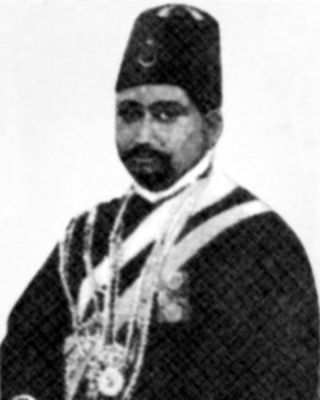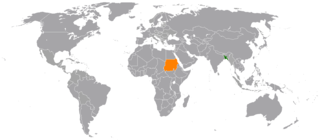
Syed Ismail Hossain Siraji was a Bengali author and poet from Sirajganj in present-day Bangladesh. He is considered to be one of the key authors of period of the Bengali Muslim reawakening; encouraging education and glorifying the Islamic heritage. He also contributed greatly to introducing the Khilafat Movement in Bengal, and provided medical supplies to the Ottoman Empire during the Balkan Wars. Anal-Prabaha, his first poetry book, was banned by the government and he was subsequently imprisoned as the first South Asian poet to allegedly call for independence against the British Raj. The government issued Section 144 against him 82 times in his lifetime.
Mohammad Yakub Ali Chowdhury was a Bengali essayist and journalist. He was noted as one of the few Bengali Muslim literary scholars of his time.

Dhaka (Dacca) is a modern megacity with origins dating to circa the 7th century CE. The history of Dhaka begins with the existence of urbanised settlements that were ruled by the Hindu Gauda Kingdom, Buddhist and Shaivite Pala Empire before passing to the control of the Hindu Sena dynasty in the 10th century CE. After the Sena dynasty, the city was ruled by the Hindu Deva Dynasty.

Hakim Habibur Rahman was an Unani physician, litterateur, journalist, politician and chronicler in early 20th-century Dhaka.

Nāsir ad-Dīn Naṣrat Shāh, also known as Nusrat Shah, was the second Sultan of Bengal belonging to the Hussain Shahi dynasty. He continued with his father's expansionist policies but by 1526, had to contend with the Mughal ascendency in the Battle of Ghaghra. Simultaneously, Nasrat Shah's reign also suffered a reverse at the hands of the Ahom kingdom. The reigns of Alauddin Husain Shah and Nasrat Shah are generally regarded as the "golden age" of the Bengal Sultanate.
Jatrabari Thana is a metropolitan thana within the megacity of Dhaka in central Bangladesh. It is known for its steel furniture industry.
Shāhzāda Bārbak, known by his regnal title as Ghiyāsuddīn Bārbak Shāh, was the Sultan of Bengal in 1487 and the founder of the Sultanate's Habshi dynasty. He was a former commander of the palace-guards of Jalaluddin Fateh Shah court.

Mohammad Mozammel Huq was a Bengali-language poet, novelist, magistrate and educationist. His writings were said to have been inspired by a "Muslim renaissance".
Nawab Bahadur was a title of honour bestowed during Mughal Empire and later during British Raj to Indian Muslim individuals for faithful service or acts of public welfare.

Bangladesh–Sudan relations refers to the bilateral relations between Bangladesh and Sudan. Colleges in Bangladesh, like the Sher-e-Bangla Medical College, have hosted students from Sudan.
Mirza Muhammad Yusuf Ali was a Bengali writer and reformer in British India.

Shāh ʿAlī al-Baghdādī was a 15th-century Muslim missionary and Sufi saint based in the Faridpur and Dhaka regions of Bengal.
Ashrafuddin Ahmad Chowdhury was a Bengali politician who had served as general secretary of the Congress Party's Bengal branch, member of the East Bengal Legislative Assembly and later as the education minister of Pakistan. He was an advocate of Huseyn Shaheed Suhrawardy's United Bengal proposal.

Syed Abdul Majid, CIE, also known by his nickname Kaptan Miah, was a politician, lawyer and entrepreneur. He is notable for pioneering the development in the agricultural and tea industry in British India as well as his contributions to both secular and Islamic education in Sylhet.
Dobhashi or Dobhashi Bengali is a neologism used to refer to a historical register of the Bengali language which borrowed extensively, in all aspects, from Arabic and Persian. It became the most customary form for composing puthi poetry predominantly using the traditional Bengali alphabet. However, Dobhashi literature was produced in the modified Arabic scripts of Chittagong and Nadia. The standardisation of the modern Bengali language during the colonial period, eventually led to its decline.
The Kohinoor was a Bengali language newspaper, first published in July 1898. Initially focusing on miscellaneous topics such as Islamic culture, its third relaunch was a pivot of Hindu-Muslim harmony. The paper targeted both Hindu and Muslim clientele.
Mohammad Raushan Yazdani was a Bengali author and researcher of folk literature. As a folklorist, his work was crucial due to his discoveries of tales and poems from the remotest villages of eastern Bengal. His most celebrated work is Momenshahir Loka-Sahitya dedicated to folk literature in Momenshahi (Mymensingh) Yazdani was one of the most popular Bengali poets in the Pakistan period.

Tanda, also known as Tandah and Khwaspur Tandah, was a historic 16th-century city of Bengal in the eastern part of South Asia, and one of the most prominent medieval capitals; serving the Karrani Sultans of Bengal and the early Mughal governors of Bengal.

Nūr Qut̤b ʿĀlam was a 14th-century Bengali Islamic scholar, author and poet. Based in the erstwhile Bengali capital Hazrat Pandua, he was the son and successor of Alaul Haq, a senior scholar of the Bengal Sultanate. He is noted for his efforts in preserving the Muslim rule of Bengal against Raja Ganesha and pioneering the Dobhashi tradition of Bengali literature.









